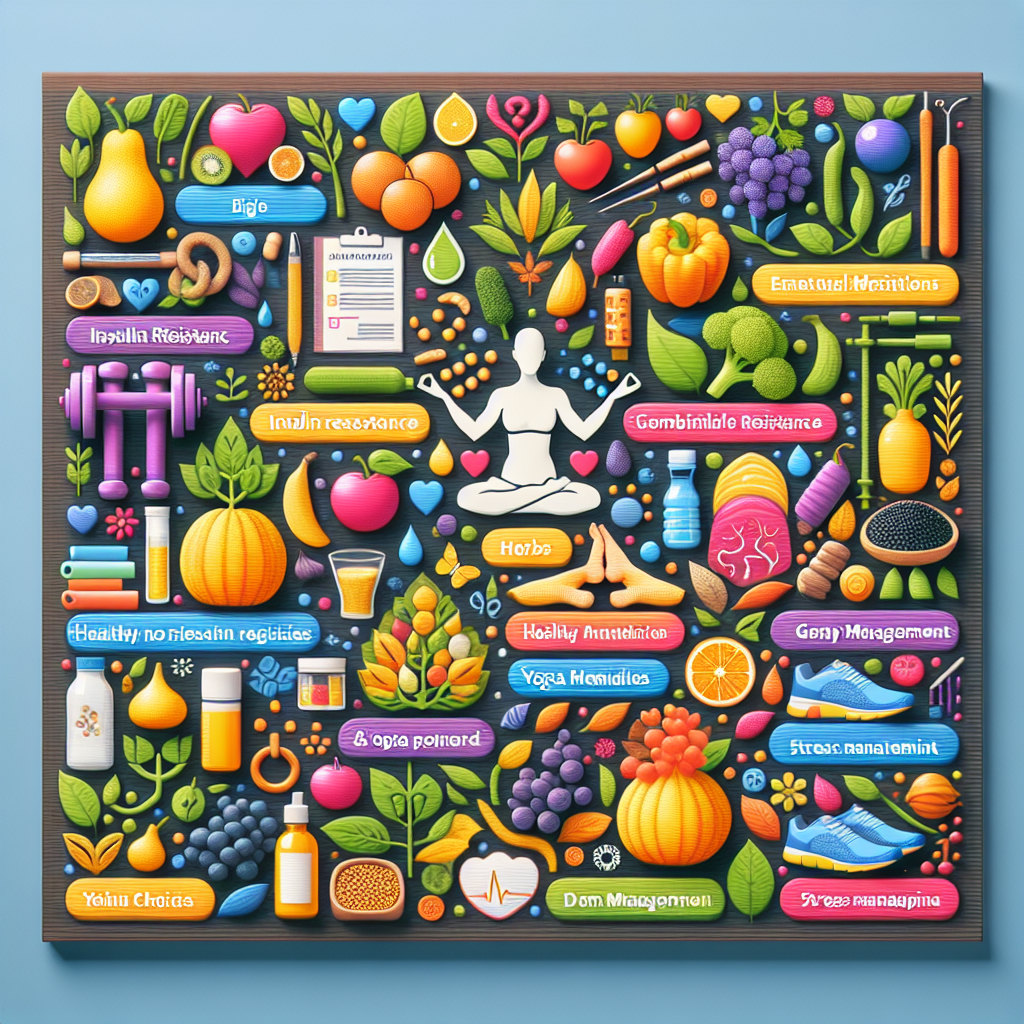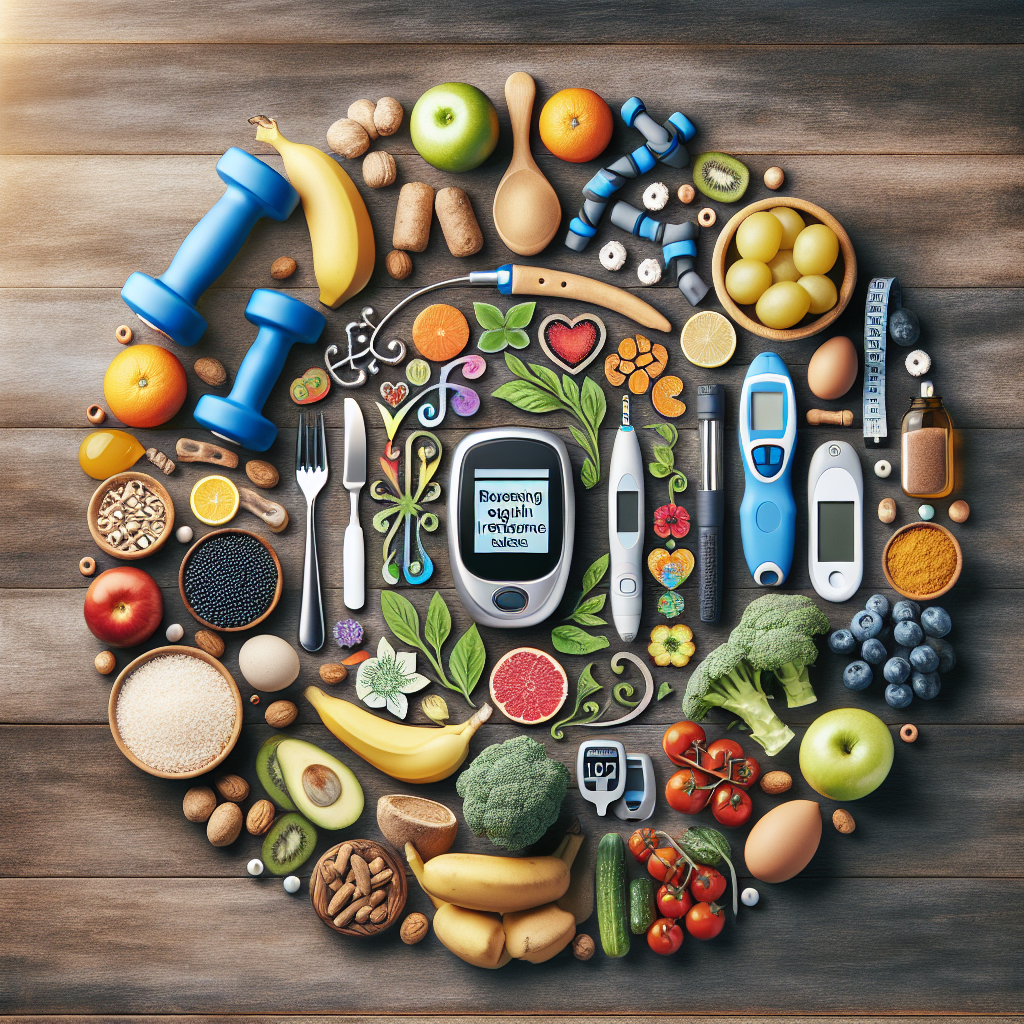Holistic Tools for Reversing Early Signs of Insulin Resistance

Discover holistic tools for reversing early signs of insulin resistance today! Take control of your health and wellbeing. Visit My Vibrant Vitality now.
Exploring Holistic Approaches to Reverse Early Signs of Insulin Resistance
Insulin resistance is a condition that has become increasingly prevalent in today’s society. It is a metabolic disorder where the body’s cells become less responsive to the hormone insulin, leading to high blood sugar levels. This condition is often a precursor to type 2 diabetes and other health complications. However, the early signs of insulin resistance can be reversed, and holistic approaches are gaining recognition for their effectiveness in this regard.
Holistic medicine, unlike conventional medicine, focuses on the whole person and not just the disease. It emphasizes the connection between the mind, body, and spirit, and believes in the body’s inherent ability to heal itself. This approach to health and wellness offers a variety of tools that can be used to reverse the early signs of insulin resistance.
One of the most effective holistic tools is a balanced diet. Consuming a diet rich in whole foods, particularly fruits, vegetables, lean proteins, and whole grains, can significantly improve insulin sensitivity. These foods are high in fiber, which slows down the digestion process and prevents sudden spikes in blood sugar levels. Additionally, they are packed with essential nutrients that support overall health and wellness. It is also advisable to limit the intake of processed foods, sugary drinks, and unhealthy fats, as they can exacerbate insulin resistance.
Physical activity is another crucial component of a holistic approach to reversing insulin resistance. Regular exercise helps to maintain a healthy weight, which is vital in managing insulin sensitivity. It also aids in the efficient use of insulin by the body’s cells, thereby reducing blood sugar levels. A combination of aerobic exercises, such as walking or cycling, and strength training exercises, like weight lifting, can be particularly beneficial.
Stress management is also a key holistic tool in combating insulin resistance. Chronic stress can lead to hormonal imbalances that worsen insulin resistance. Techniques such as meditation, yoga, and deep breathing exercises can help to reduce stress levels and promote a sense of calm and well-being. These practices not only help to balance the body’s hormones but also improve mental health, which is often overlooked in the management of physical conditions.
Supplementation can also play a role in reversing insulin resistance. Certain natural supplements, such as cinnamon, chromium, and alpha-lipoic acid, have been found to improve insulin sensitivity. However, it is important to consult with a healthcare provider before starting any supplementation regimen, as some supplements can interact with medications or have side effects.
Lastly, adequate sleep is essential in managing insulin resistance. Lack of sleep can disrupt the body’s hormonal balance, leading to increased insulin resistance. Therefore, ensuring a good night’s sleep is a vital part of a holistic approach to health.
In conclusion, holistic approaches offer a variety of tools for reversing the early signs of insulin resistance. These include a balanced diet, regular physical activity, stress management techniques, supplementation, and adequate sleep. By focusing on the whole person and not just the disease, holistic medicine provides a comprehensive approach to health and wellness that can effectively manage and even reverse insulin resistance.
Natural Tools and Techniques for Combating Early Insulin Resistance

Insulin resistance is a condition that affects millions of people worldwide. It is a precursor to type 2 diabetes and is characterized by the body’s inability to effectively use insulin, a hormone that regulates blood sugar levels. The early signs of insulin resistance include fatigue, hunger, difficulty concentrating, and weight gain. Fortunately, there are several holistic tools and techniques that can help reverse these early signs and prevent the progression of insulin resistance.
One of the most effective natural tools for combating insulin resistance is a balanced diet. Consuming a diet rich in whole grains, lean proteins, fruits, vegetables, and healthy fats can help regulate blood sugar levels and improve insulin sensitivity. Foods high in fiber, such as whole grains and legumes, slow down the absorption of sugar into the bloodstream, preventing spikes in blood sugar levels. Lean proteins and healthy fats, on the other hand, help to keep you feeling full, reducing the likelihood of overeating and weight gain, which can exacerbate insulin resistance.
In addition to a balanced diet, regular physical activity is another crucial tool in the fight against insulin resistance. Exercise helps to increase insulin sensitivity by promoting the uptake of glucose into the muscles for energy. This reduces the amount of glucose in the bloodstream, thereby reducing the demand for insulin. A combination of both aerobic exercises, such as walking or cycling, and resistance training, such as weight lifting, can be particularly effective.
Another natural technique for combating insulin resistance is stress management. Chronic stress can lead to hormonal imbalances that can worsen insulin resistance. Techniques such as yoga, meditation, and deep breathing exercises can help to reduce stress levels and improve insulin sensitivity. These practices not only help to calm the mind but also have a positive effect on the body’s hormonal balance.
Supplementation can also play a role in reversing early signs of insulin resistance. Certain natural supplements, such as chromium, magnesium, and alpha-lipoic acid, have been shown to improve insulin sensitivity. Chromium helps to enhance the action of insulin, while magnesium plays a role in the secretion and function of insulin. Alpha-lipoic acid, on the other hand, is an antioxidant that can help to reduce inflammation and improve insulin sensitivity.
Lastly, getting enough sleep is an often overlooked but essential tool in combating insulin resistance. Lack of sleep can lead to hormonal imbalances that can worsen insulin resistance. Aim for seven to nine hours of quality sleep per night to help regulate your body’s insulin response.
In conclusion, while insulin resistance can be a daunting condition, there are several holistic tools and techniques that can help to reverse its early signs. A balanced diet, regular physical activity, stress management techniques, supplementation, and adequate sleep can all play a role in improving insulin sensitivity and preventing the progression of insulin resistance. By incorporating these practices into your daily routine, you can take a proactive approach to your health and well-being.
Holistic Methods for Preventing and Reversing Insulin Resistance
Insulin resistance is a condition that has become increasingly prevalent in today’s society. It is a metabolic disorder where the body’s cells become resistant to the effects of insulin, a hormone that regulates the metabolism of carbohydrates, fats, and proteins. This resistance can lead to a host of health problems, including type 2 diabetes, heart disease, and obesity. However, the good news is that insulin resistance can be prevented and even reversed through holistic methods that focus on lifestyle changes and natural remedies.
One of the most effective holistic tools for reversing early signs of insulin resistance is a balanced diet. Consuming a diet rich in whole foods, such as fruits, vegetables, lean proteins, and whole grains, can help to regulate blood sugar levels and improve insulin sensitivity. Foods high in fiber, such as beans, lentils, and whole grains, are particularly beneficial as they slow down the digestion process and prevent spikes in blood sugar. Additionally, incorporating foods rich in omega-3 fatty acids, such as fatty fish, walnuts, and flaxseeds, can help to reduce inflammation and improve insulin resistance.
Another crucial aspect of a holistic approach to reversing insulin resistance is regular physical activity. Exercise helps to increase insulin sensitivity by promoting the uptake of glucose into the cells for energy. This can be achieved through a combination of aerobic exercises, such as walking, running, or cycling, and resistance training, such as weight lifting. It is recommended to aim for at least 30 minutes of moderate-intensity exercise most days of the week.
Stress management is another key component in the holistic approach to preventing and reversing insulin resistance. Chronic stress can lead to hormonal imbalances that can exacerbate insulin resistance. Techniques such as yoga, meditation, deep breathing exercises, and mindfulness can help to reduce stress levels and improve insulin sensitivity.
Sleep is often overlooked but is a vital part of maintaining optimal health and preventing insulin resistance. Lack of sleep or poor-quality sleep can lead to hormonal imbalances, increased appetite, and weight gain, all of which can contribute to insulin resistance. Therefore, ensuring you get a good night’s sleep is an essential part of a holistic approach to reversing insulin resistance.
Natural supplements can also be beneficial in managing insulin resistance. For instance, chromium, a mineral found in certain foods, can enhance the action of insulin and improve glucose tolerance. Similarly, cinnamon has been shown to lower blood sugar levels and improve insulin sensitivity. However, it’s important to consult with a healthcare provider before starting any supplement regimen.
Lastly, maintaining a healthy weight is crucial in preventing and reversing insulin resistance. Excess body fat, particularly around the abdomen, can lead to increased insulin resistance. Therefore, achieving and maintaining a healthy weight through a balanced diet and regular physical activity can significantly improve insulin sensitivity.
In conclusion, insulin resistance is a serious condition that can lead to various health problems if left unchecked. However, through a holistic approach that includes a balanced diet, regular physical activity, stress management, adequate sleep, natural supplements, and maintaining a healthy weight, it is possible to prevent and even reverse the early signs of insulin resistance. This approach not only helps to manage insulin resistance but also promotes overall health and well-being.